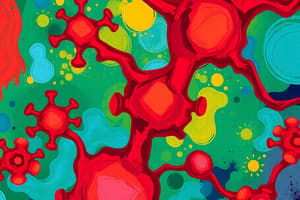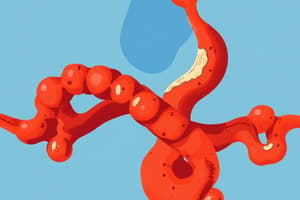Podcast
Questions and Answers
What is the primary action of oxytocin in a clinical setting?
What is the primary action of oxytocin in a clinical setting?
- Decreases blood pressure
- Inhibits uterine contractions
- Stimulates uterine contractions during labor (correct)
- Matures ovarian follicles
Which of the following medications decreases inflammation in the intestine?
Which of the following medications decreases inflammation in the intestine?
- Azathioprine
- Sulfasalazine (correct)
- Ondansetron
- Metoclopramide
Which classification of diuretic works primarily in the distal convoluted tubule?
Which classification of diuretic works primarily in the distal convoluted tubule?
- Thiazide diuretics (correct)
- Osmotic diuretics
- Potassium-sparing diuretics
- Loop diuretics
What type of immunity is conferred by receiving a vaccine?
What type of immunity is conferred by receiving a vaccine?
Which of the following medications is designed to activate muscarinic receptors in the detrusor muscle?
Which of the following medications is designed to activate muscarinic receptors in the detrusor muscle?
What is the primary action of Cox enzymes in the body?
What is the primary action of Cox enzymes in the body?
Which of the following is a common sign of salicylism, or aspirin toxicity?
Which of the following is a common sign of salicylism, or aspirin toxicity?
What is the expected action of Allopurinol in the treatment of gout?
What is the expected action of Allopurinol in the treatment of gout?
What is a key nursing assessment focus for patients receiving Butorphanol?
What is a key nursing assessment focus for patients receiving Butorphanol?
What are the side effects associated with glucocorticoids?
What are the side effects associated with glucocorticoids?
Which substance is used to treat hypothyroidism?
Which substance is used to treat hypothyroidism?
What is the role of Carbidopa in the combination of Levodopa/Carbidopa therapy?
What is the role of Carbidopa in the combination of Levodopa/Carbidopa therapy?
What is the primary effect of radioactive iodine on thyroid hormone-producing cells?
What is the primary effect of radioactive iodine on thyroid hormone-producing cells?
Which of the following is a symptom of hyperglycemia?
Which of the following is a symptom of hyperglycemia?
What is the onset time for rapid-acting insulin like Lispro (Humalog)?
What is the onset time for rapid-acting insulin like Lispro (Humalog)?
Which insulin type has the longest duration of action?
Which insulin type has the longest duration of action?
Which of the following is NOT a common symptom associated with hypoglycemia?
Which of the following is NOT a common symptom associated with hypoglycemia?
What serious side effect is associated with diabetic medications?
What serious side effect is associated with diabetic medications?
Which insulin type is considered short-acting?
Which insulin type is considered short-acting?
Which medication is used to prevent seizures due to preeclampsia/eclampsia?
Which medication is used to prevent seizures due to preeclampsia/eclampsia?
What is the peak action time for NPH (Humulin N) insulin?
What is the peak action time for NPH (Humulin N) insulin?
Which condition is particularly related to the symptoms of nausea and weakness/fatigue?
Which condition is particularly related to the symptoms of nausea and weakness/fatigue?
Flashcards
Cox Enzymes Action
Cox Enzymes Action
Inhibit cyclooxygenase, an enzyme that converts arachidonic acid to prostaglandins during tissue injury.
Aspirin Toxicity (Salicylism) Signs
Aspirin Toxicity (Salicylism) Signs
Symptoms of aspirin overdose (salicylism) are not specified in the provided text.
Ibuprofen COX 1 Administration Teaching
Ibuprofen COX 1 Administration Teaching
Patient teaching related to ibuprofen administration regarding COX 1 is not available in the text.
Glucocorticoid Nursing Interventions
Glucocorticoid Nursing Interventions
Signup and view all the flashcards
Opioid: Butorphanol Nursing Assessment
Opioid: Butorphanol Nursing Assessment
Signup and view all the flashcards
Uricosurics (Allopurinol) Action
Uricosurics (Allopurinol) Action
Signup and view all the flashcards
Levothyroxine Use
Levothyroxine Use
Signup and view all the flashcards
Sildenafil (Viagra)
Sildenafil (Viagra)
Signup and view all the flashcards
Beta-adrenergic agonist
Beta-adrenergic agonist
Signup and view all the flashcards
Oxytocin
Oxytocin
Signup and view all the flashcards
Metoclopramide
Metoclopramide
Signup and view all the flashcards
Azathioprine
Azathioprine
Signup and view all the flashcards
Radioactive Iodine Use
Radioactive Iodine Use
Signup and view all the flashcards
Diabetic Medications (Hypoglycemics)
Diabetic Medications (Hypoglycemics)
Signup and view all the flashcards
Hyperglycemia Symptoms
Hyperglycemia Symptoms
Signup and view all the flashcards
Hypoglycemia Symptoms
Hypoglycemia Symptoms
Signup and view all the flashcards
Lispro (Humalog)
Lispro (Humalog)
Signup and view all the flashcards
Regular Insulin (Humulin R)
Regular Insulin (Humulin R)
Signup and view all the flashcards
NPH Insulin
NPH Insulin
Signup and view all the flashcards
Insulin Glargine (Lantus)
Insulin Glargine (Lantus)
Signup and view all the flashcards
Adrenal Insufficiency
Adrenal Insufficiency
Signup and view all the flashcards
Magnesium Sulfate Use
Magnesium Sulfate Use
Signup and view all the flashcards
Study Notes
2024 3205 Pharmacology II - Final Exam Study Guide
-
Cox Enzymes (COX-1 & COX-2)
- Inhibit cyclooxygenase (enzyme converting arachidonic acid to prostaglandins)
- COX-1: Protective prostaglandins (homeostasis, gastric mucosa, platelet aggregation, kidney function)
- COX-2: Prostaglandins in response to injury (pain, inflammation, fever)
-
Aspirin
- Salicylism (toxicity): tinnitus, dizziness, excessive sweating, headache, decreased hearing, N/V, fever, diarrhea, confusion, seizures
- Medical emergency: charcoal, tepid water, electrolyte correction, gastric lavage
-
Ibuprofen
- Take with food/milk/water, avoid alcohol
- Report gastric irritation, change in urine output, weight gain, fluid retention
- Avoid foods high in salicylates
- Report symptoms
- Do not give to children
- Side effects: stomach pain, constipation, diarrhea, gas, heartburn, N/V, dizziness, headache, rash, GI bleeding
-
Glucocorticoids
- Increased dose during stress/illness
- Monitor blood glucose and adjust
- Lowest possible dose, alternate day dosing
- Monitor GI bleeds, implement GI protection measures
- Monitor I/O, edema, lung crackles, weight gain, generalized weakness
-
Opioids (e.g., Morphine, Butorphanol)
- Agonist-antagonist: Butorphanol, Pentazocine
- Morphine: Do not breastfeed while taking, decreased fertility (men & women), shallow/noisy breathing issues, confusion
- Butorphanol: Monitor respiratory status (rate, depth, shallow breathing, bradypnea)
-
Uricosurics (e.g., Allopurinol)
- Lower uric acid in the blood to treat gout
- Side effects:
-
Antiseizure Medications
- Common side effects
- Concerning adverse reactions
- Evaluation of effectiveness
- Common drug interactions
- Patient teaching
-
Antipsychotics
- Extrapyramidal symptoms: involuntary movements, muscle stiffness, tremors, anxiety, drowsiness, lethargy; excessive salivation, fixed stare, tongue protrusion, lip smacking, facial grimacing
- Common side effects
- Patient teaching
-
Levodopa/Carbidopa
- Levodopa increases dopamine in basal ganglia, carbidopa permits more levodopa to brain transport
- Side effects/adverse reactions: GI effects, dyskinesias (head bobbing, tics, grimacing, tremors), orthostatic hypotension, tachycardia, palpitations, psychosis, discolored sweat and urine
-
Diazepam
- Treat depression/anxiety, muscle spasms, seizures
- Side effects: CNS depression, fatigue, sleepiness, dizziness, paradoxical reactions, addictive, withdrawal symptoms
-
Baclofen (Muscle Relaxant)
- Treat spasticity from multiple sclerosis, spinal cord injuries or other spinal cord diseases
- Side effects: CNS depression, urinary retention, constipation, dry mouth
-
Antidepressants
- Common side effects: insomnia, orthostatic hypotension, decreased libido, anticholinergic effects (dry mouth, constipation, urinary retention, blurred vision), weight gain
- Safety: 1-4 weeks to reach full therapeutic effect, slow taper, avoid sudden stop
- Caution in older adults, potential for suicidal ideation
-
Albuterol
- Use: stimulate receptors, resulting in bronchodilation. Short-acting for acute exacerbation, long-acting for long-term control.
- Side effects: tachycardia, heart palpitations, tremors, angina, paradoxical spasms (bronchospasm)
-
Theophylline
-
Inhaled Glucocorticoids (Beclomethasone)
- Mechanism of action: suppress immune response, decreasing inflammation and edema of airways
-
Montelukast
-
Antihistamines (e.g., Benadryl, Zyrtec)
- OTC medications, block histamine release
- Side effects: drowsiness, anticholinergic effects
-
Antitussives
- Suppress the cough reflex
-
Expectorants
- Patient edu: Avoid driving, change positions slowly, take with food/milk if N/V occurs, avoid combining with other medications
-
Levothyroxine (Hypothyroidism)
- Signs: fatigue, weight gain, cold sensitivity, dry skin/hair loss, bradycardia, puffy face, hoarse voice, joint/muscle pain, constipation, depression
- Signs (Hyperthyroidism): heat intolerance, rapid/irregular heart beat, heart palpitations, tachycardia, unintentional weight loss, bulging eyes, thick/flaking nails, hair loss
-
Propylthiouracil (PTU)
- Blocks thyroid hormone synthesis (prevents iodide oxidation)
-
Radioactive Iodine
-
Diabetic Medications
- Hypoglycemia: mild (54-70): 15-20g fast carb, complex carb, recheck after 15 minutes. Moderate/severe (<54): Glucagon IM/SQ, IV dextrose 50%, monitor vitals, O2 if needed
-
Insulin Analogs (Lispro, Regular, NPH, Glargine)
- Rapid, regular, intermediate, long-acting
- Side effects: N/V, D
-
Cortisol
- Adrenal insufficiency (if stopped abruptly after long-term use)
- Immunosuppression
- Growth suppression
- Osteoporosis risk
- Side effects: weight gain, mood changes, anxiety, depression, insomnia, increased appetite, hirsutism, less common: HTN, glucose intolerance, cataracts, glaucoma, increased infection risk
- Rare, serious: Adrenal insufficiency, pancreatitis, peptic ulcers, psychotic episodes
-
Magnesium Sulfate (Preeclampsia/Eclampsia)
- Prevents seizures
- Side effects: Magnesium toxicity (hypotension, bradycardia, depressed DTRs, altered LOC).
-
Sildenafil (Viagra)
- Safety precautions: myocardial infarction, cerebrovascular accident, dysrhythmias, unstable angina, heart failure, hepatic or renal disease
-
Beta-adrenergic agonist (Oxytocin)
- Uterine stimulant during labor
- Safety: cardiac arrhythmias, myocardial infarction, stroke, seizures, water intoxication
- Clomiphene: Stimulates follicle maturation (multiple births possible)
- Bethanechol: Activates muscarinic receptors in the detrusor muscle (bladder contracts, internal sphincter relaxes)
-
Testosterone
- Administration: SQ, IM, PO, gel, patch, oral pellet
- Side effects: virilization, epiphyseal closure, cholestatic hepatitis, hypercholesterolemia, prostate cancer growth, polycythemia, edema from salt and water retention, potential for misuse, hypercalcemia, hypoglycemia
-
Aluminum hydroxide, Calcium carbonate, Milk of magnesia (Antacids)
- Side effects: constipation, diarrhea
-
Azathioprine
- Decreases immune response, neutropenic precautions
-
Metoclopramide
- Reflux/gastroparesis (tightens sphincter between esophagus and stomach)
-
Sulfasalazine
- Decreases inflammation in the intestine
- Side effects: yellow/orange urine, photosensitivity, nausea, fever, rash, hematologic disorders
-
Odansetron (Nausea/Vomiting)
- Used for chemo- or post-op nausea/vomiting – side effects: headache, dizziness, constipation, diarrhea – Precautions: risk for falls
-
Serotonin Syndrome (with some medications, body overcomes blockage and over-floods)
- Psyllium
- Patient Instructions: Take with 8 ounces of water/fluid. Take one to three times per day. Expect results in 1–3 days.
- Sulcrafate
- Patient Instructions: Give with 8 ounces of fluid. Expect results in several days.
- Psyllium
-
Diuretics
- Thiazides (distal convoluted tubule), Loops (loop of Henle), Potassium-Sparing (distal tubule)
-
Epoetin
- Purpose: Increase RBCs
- Side effects: HTN, MI, HF, CVA, cardiac arrest
- Evaluation: Monitor Hgb and HCT
-
Warfarin
- Purpose: Inhibits vitamin K synthesis
- Side effects: Avoid NSAIDs, anticonvulsants, oral contraceptives
-
Heparin/Enoxaparin
- Patient teaching: Avoid NSAIDS, use soft toothbrushes, report petechiae or black, tarry stools
- Antidote: Protamine sulfate
- Monitoring: VS, aPTT, and platelet count
-
Ferrous Sulfate
- Monitoring: Discontinue when anemia is resolved
- Side effects: staining of teeth, GI distress, N/V
- Administration: Oral
-
Filgrastim
- Side effects: bone pain, fever, splenomegaly
-
Clopidogrel
- Purpose: Inhibit platelet aggregation
- Side effects: GI upset, bleeding, thrombocytopenic purpura
- Monitoring: platelet count, Hgb
- Patient instructions: Take with food. Interactions with PPI, NSAIDs, alcohol.
-
Factor VIII
- Purpose: Treatment of blood disorders
- Administration: IV bolus over 5-10 mins
- Patient Teaching: Avoid NSAIDS
Studying That Suits You
Use AI to generate personalized quizzes and flashcards to suit your learning preferences.




